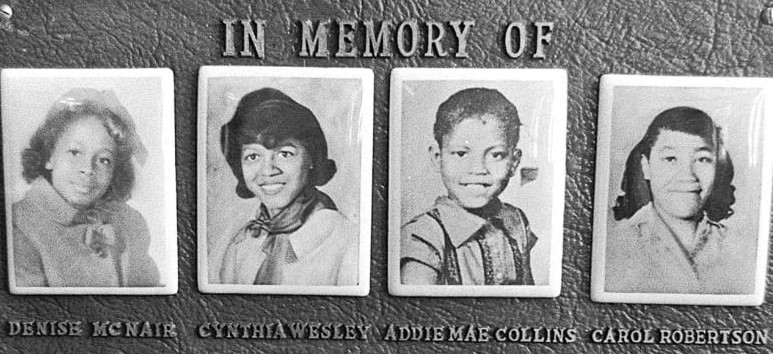The 16th Street Baptist Church Bombing took place on September, 15 1963, just 19 days after Dr. Martin Luther King gave his “I Have A Dream” speech at the March on Washington, in Washington, D.C. Four young girls, Denise McNair, age 11, and Cynthia Wesley, Carole Robertson, and Addie Mae Collins, all age 14, were killed in the racially motivated attack by the Ku Klux Klan against an African American church active in the ongoing civil rights campaign in Birmingham, Alabama.
The attack was meant to disrupt black community activists who had been demonstrating for weeks for an end to racial segregation in the city. It had the opposite effect. Because the four young girls killed were on their way to a basement assembly hall for closing prayers on a Sunday morning, the national public’s anger and revulsion at the slaughter of children at a place of worship helped build support in the John Kennedy administration for civil rights legislation. Twenty-two others were injured, many of them children that had been in the same group as the girls.
Sixteenth Street Baptist Church had been a rallying point for civil rights activists throughout the spring and summer of 1963 leading up to the bombing. The activists had finally reached an agreement with Birmingham authorities to begin integrating schools, and segregationists were outraged. Four men (Bobby Frank Cherry, Thomas Blanton, Robert Chambliss, and Herman Cash), who were members of the United Klans of America, went to the church and planted nineteen sticks of dynamite behind the basement of the building.
The explosion, which occurred around 10:20 that Sunday morning, destroyed the rear end of the building. The steps going outside were destroyed as were all but one of the church’s stained glass windows. Many nearby cars outside damaged or destroyed, and even the windows of the laundromat across the street were blown out.
The public funeral for three of the girls attracted over 8,000 people, but not one Birmingham or Alabama official attended. The Birmingham Post-Herald reported a month later that in the aftermath of the bombing no one had been arrested for the incident itself, but twenty-three African Americans had been arrested for charges ranging from disorderly conduct to “being drunk and loitering,” mostly in the vicinity of the church. One black youth was gunned down by police after he threw rocks at passing cars with white passengers.
Of the four terrorist involved in the bombing, Robert Chambliss was tried for murder first. He was convicted in 1977 and died in prison in 1985. Blanton and Cherry were convicted of murder in 2001 and 2002, respectively, and they were both sentenced to life in prison. Cherry died in 2004. The fourth terrorist, Herman Cash, died in the 1994 before charges could be brought against him.

